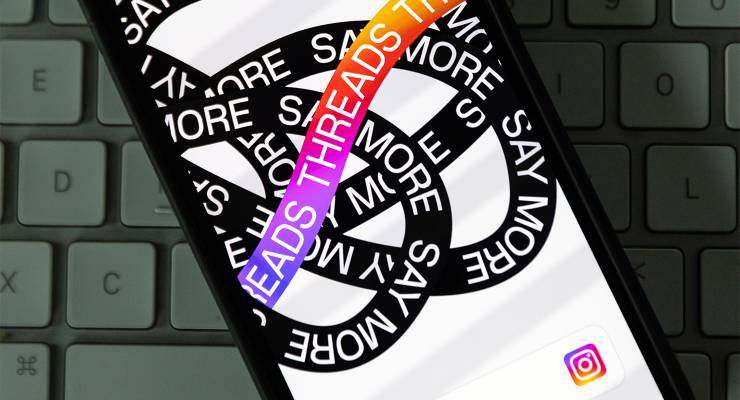
This past week saw a flash of lightning in the gloom of dying big social media platforms. That flash lit up Meta, of all companies, which has offered to rescue our love of micro-blogging commentary with its new social media platform, Threads — the super-ego of Instagram’s gentility as a balm for the pure id of rage that Elon Musk’s Twitter has become.
But beware geeks bearing gifts. When you take off the rose-coloured glasses, it looks like Threads is just another monopoly play by the most under pressure of the tech giants. Worse, it recognises there’s no room for growth in social media. All that’s left is the cage match, platform v platform: two walk in, one walks out.
In Silicon Valley, the holy grail of the would-be monopolists is what Musk has called “the everything app” — and what Dave Eggers called in his 2021 dystopian novel, simply, “The Every“. It’s the all-purpose interface between you and the world, with one-to-one or one-to-few messaging, social networking (in all its manifestations), ways to move money around and, above all, do your shopping and e-commerce — all in one place! (China’s WeChat is already much closer to “everything” than any of the US platforms.)
For about eight years now, Meta has been attempting, and failing, to translate its dominance of social media into become the “everything” of choice. It has tested and abandoned video, newsletters, dating, cyber-currency — even news. It’s left with what it started, or bought: the ad-heavy, one-to-many social distribution of Facebook and Instagram and the difficult-to-monetise communication tools of Messenger and WhatsApp.
For the past two years, it’s been attempting (unsuccessfully) to recapture the social media magic of its origins with the Metaverse, losing about US$1 billion a month in its bid to give legs to its virtual reality vision.
In both Wall Street and Silicon Valley, the monopoly of everything held out the promise of a perpetual motion machine of ever-gushing corporate growth. It was a promise that saw the share prices of tech giants like Meta (and even relative minnows like Twitter) outstrip their actual real-world revenues.
Until it didn’t. Early last year, Wall Street assessed that big tech had rolled through the business product life cycle from growth to commodity — from the ever-growing star to the low-growth cash cow, as the BCG matrix put it. That’s where you’ll find Meta’s “family of apps” now: drearily, profitably, flat — both in user numbers and, more importantly, revenue.
To grow revenues, cash cows need to be milked ever harder, leading to what Cory Doctorow dubbed “enshittification”:
Here is how platforms die: first, they are good to their users; then they abuse their users to make things better for their business customers; finally, they abuse those business customers to claw back all the value for themselves. Then, they die.
On the tech platforms, it’s advertising that’s enshittifying the interface. Google morphing from ad-supported search to a search-light advertising delivery system; Netflix abandoning its commitment to an ad-free entertainment experience; Meta’s search for ever-deeper surveillance to drive an increasing volume of ads.
Count Threads (and Musk’s alt-right Twitter), then, as just another couple of heavily polished turds floating in big tech’s punch bowl.
But wait, there’s more. Last week European courts tapped tech’s shoulder to say: “Ah, guys, you know using your monopoly power is kinda illegal?” The European Court of Justice has approved rules by the German regulator that Meta cannot do what Threads is set up for: share personal data across platforms. The result? Meta is not making Threads available in the EU.
And that’s before the union’s proposed regulatory framework, the Digital Markets Act aimed at big tech’s large monopoly “gatekeepers”, comes into effect next year.
In Canada, Meta (and Google) are rolling out their Australian-tested response to legislated demands that they bargain with news codes. After Canada legislated the Online News Act, requiring the big platforms to bargain with news publishers (modelled on Australia’s news media bargaining code), both Meta and Google threatened to bar Canadian news from their platforms. A similar law is moving through the Democrat-controlled congress of Meta’s home state, California.
Meta seems to think that, for it at least, no news might be good news. It has been algorithmically throttling news since 2017 and last year axed (or severely truncated) the News tab, cut funding to news publishers and renamed the “News Feed” as, simply, the “Feed”.
In hyping Threads, Instagram’s boss Adam Mosseri made it clear that it will have an influencer-friendly, feel-good focus on sports, music, fashion, beauty and entertainment — and a news and politics-free zone.
Sounds sh… um, awful.








The potential adverse effects of big tech and the everything ap was warned about nearly a decade ago
https://m.youtube.com/watch?v=AT9ho2G0N_Y
Worth noting to that as a digital marketer myself, I can report that both Google and Facebook (even Microsoft’s Bing) are well advanced in the “abuse those business customers to claw back all the value for themselves” phase of the cycle. Frankly death (or at least some realistic competition) cannot come soon enough.
Interesting too is how the EU is going to problematic for both and their business models, while both are mutual competitive threats (Porter’s Five Forces), the EU ‘s GDPR is another one.
With regard to the title of the article, I remember that a friend of mine once remarked “that you cannot polish a turd, though you can roll it in glitter.”
Glitter is about all these companies seem to have to offer. True substance was flushed long ago.
Twitter is a turd too. So you must decide which turd is your favorite one